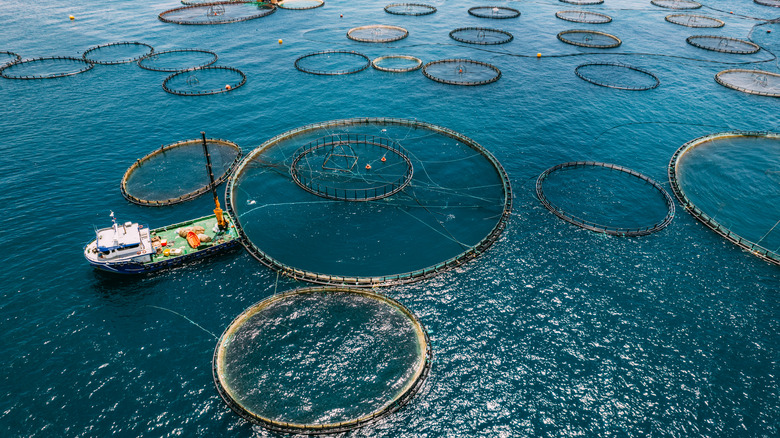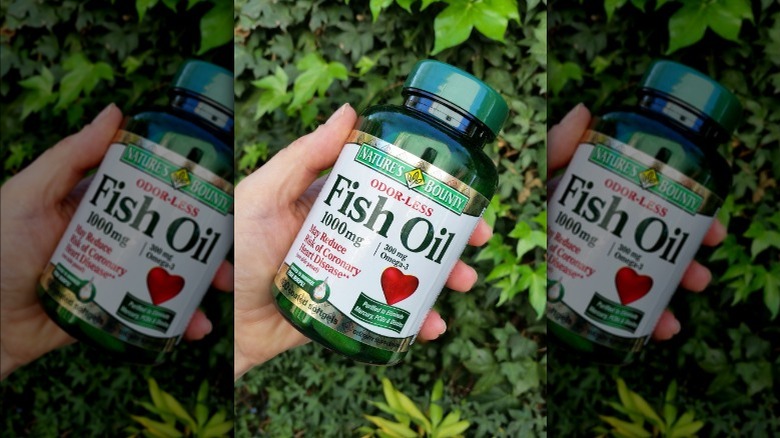What You Need To Know Before You Take Another Bite Of Tilapia
If you've ever perused a grocery store, eaten fish tacos, or just decided on having fish for dinner, chances are high that you're familiar with tilapia. Globally, tilapia is an industry worth more than $14 billion, and which is growing to soon surpass $22 billion in value, according to Asia Food Journal. It's one of the most popular types of seafood that you can find on the market and comes with plenty of benefits, along with some areas for possible concern.
You owe it to yourself to remain an informed consumer and an advocate for knowing everything that you put into your body. If you're at all a seafood aficionado, getting to know tilapia will behoove you. This type of fish is widely sold in restaurants and stores and is one of the most mass-produced foods that you'll find. Like any food item, tilapia has some details you should learn about to know how it can affect your health and how the business of tilapia affects the world and other interconnected industries. In this guide, you'll get to learn more about the fish so that you're well-informed the next time you decide to add it to your plate.
Tilapia is versatile and easy on the palate
Perhaps the main reason that tilapia is so incredibly popular is that you can do just about anything with it. People love tilapia because it's easy on the palate and not overbearing in odor or taste like some other types of fish. You can season and flavor it however you'd like, and it's easy to reproduce recipes at scale. The latter makes it a no-brainer for restaurants concerned with their bottom line. It's a cost-effective fish that's available in full supply and can be used to feed the multitudes. That's why tilapia is among the most used fish in restaurant recipe menus all over the world.
Many people who'd never call themselves seafood fans will still eat tilapia. It's often referred to as "aquatic chicken" because of this fact, and since it's so low-maintenance to produce. You'll see people cook the fish in all sorts of ways, including baked, parmesan-crusted, battered and deep-fried, grilled, and sauteed. It's a protein of choice for fish tacos and can even be used in spaghetti.
The fish is also used in easy-to-replicate recipes like pan-seared tilapia with garlic oil and sweet and sour glazed tilapia. You can dress it up however you like with garnishes and all the fixings without having to hide the taste of the fish. If you're at all hesitant when fish is brought up, tilapia serves as an excellent entry point before you get more adventurous.
You get plenty of healthy protein
Protein is often the nutrient people seek out the most, regardless of goals or fitness levels. It's an essential nutrient that dictates so much about our health and wellness. A few of the main reasons protein is so crucial are that it helps to repair and rebuild muscles, maintain bone health and density, provide energy, and facilitate the creation of new hormones.
This building block regulates so many of our body's systems and protects our health and longevity. Protein supplements are by far the most popular in their industry, and they'll soon become a $25 billion market according to Fortune Business Insights. Supplements have their place, but it's always best to stock up on the nutrients that you need with your daily food intake, and tilapia is a lean protein powerhouse.
Just 3.5 ounces of tilapia will deliver 26 grams of protein and a healthy 128 calories, per Healthline. This also includes 3 grams of healthy fats and 0 grams of carbohydrates. People looking to improve performance in the gym often keep frozen tilapia fillets on their grocery list each week. It's an excellent way to make sure that you're getting your vital building blocks from a healthy food source. The nutritional content of tilapia is one of its greatest benefits, and since the fish can be cooked in so many different ways, you can get the nutrients that you need without necessarily getting tired of it.
Most tilapia is farmed
Though tilapia comes with several benefits, it's not without its potential drawbacks. One of the greatest drawbacks is that most tilapia you will find is farmed, rather than wild-caught. In fact, tilapia is one of the most farmed fish in the world. It's farmed in more than 120 different countries and territories. This may not immediately affect you on the surface, but most health advocates advise staying away from farmed fish and sticking to the wild-caught variety. A major reason for this is that farm-raised fish are often fed corn, soy, and even animal feces. These are filler foods that fish wouldn't necessarily eat in their natural environment.
Farmed fish are also sometimes raised in unsanitary conditions, which may increase the potential for filth and disease. When tilapia are farmed, they have higher amounts of omega-6, which can potentially cause inflammation in the body. Wild-caught fish are able to swim freely in their natural habitat, which typically means you're eating a stronger, fitter fish. Farm-raised fish have advantages from a business standpoint, but it always makes more sense to eat wild-caught for your health and well-being.
Other types of fish, such as salmon, mahi-mahi, swordfish, and trout, are more commonly found in wild-caught varieties. If you're trying to eat as naturally as possible, many store-bought tilapia products will be a no-go. If this is at all a concern for you, always make sure to check the packaging to be certain whether you're buying farm-raised or wild-caught fish.
Tilapia has a deep history
Anthropologically speaking, tilapia has been with us for a very long time. The fish, native to Africa, has a deep history and has long been cultivated on the continent and throughout different parts of Asia. Tilapia was a dietary staple for the ancient Egyptians going back more than 3,000 years, according to Electrum Magazine. This predates most major modern food inventions and is a good sign that human beings have long benefited from consuming tilapia.
The Egyptians even gave tilapia its own hieroglyph based on fish caught from the Nile River. They saw this fish as a symbol of rebirth, and references to tilapia have been found on numerous relics from the era. Tilapia also has Biblical significance, as it is believed by some to be the fish referenced in the Book of Matthew that Jesus multiplies to feed 5,000 people.
Regardless of your spiritual leanings, it says something that human beings so long ago held this fish in such high regard and treated it with such reverence. Perhaps the fact that tilapia feeds so many people all over the world and generates such wealth illustrates a deeper significance that still remains today.
It's among the most eaten fish
The big business of tilapia is no mere coincidence, as the fish ranks highly among the most-eaten fish in the entire world. In the United States alone, more than 400 million pounds of tilapia are consumed annually. And because the fish is such a global staple, that's just one small piece of the overall tilapia market.
The diversity of this fish has to be a major reason why it's consumed at such frequency. You can make it however you like, and people with all different tastes enjoy tilapia. It's also far less expensive than other types of seafood. It's a no-brainer for families because a bag or two of tilapia can make entrees that feed your whole family at a reasonable cost. People can also get regular doses of vitamins and nutrients through tilapia, which means the popularity likely won't slow down anytime soon.
Tilapia is a catch-all phrase
Though you're getting a crash course in tilapia, it might shock you to learn that every time this word is used, it doesn't refer to any one specific species. Contrary to popular belief, tilapia isn't a species of fish at all, but rather a catch-all phrase for certain kinds of fish found in specific parts of the world. In fact, there are close to 100 different types of tilapia. It's a generic name that refers to fish that share characteristics, particularly with respect to reproductive behavior.
Fish in the genus Sarotherodon hold fertilized eggs in their mouths for protection, while tilapia have parent fish to watch over the eggs and protect them from predators. Tilapia also share the noteworthy characteristic of having a strong tolerance for poor water conditions. This is a big reason why they're one of the most farmed fish in the world and among the most economically viable.
While this versatility is fascinating, it also means that as a consumer, you may not know exactly what you're getting when you go to purchase tilapia. For example, when you purchase Pacific salmon, you're only dealing with seven different species. Mahi-mahi refers to a specific type of dolphinfish. It might take a little bit of research and discretion to know exactly what you're getting when you purchase tilapia fillets or order the fish on a menu.
It's not as rich in Omega 3 as other fish
Aside from protein, people also turn to fish as a healthy source of Omega-3 fatty acids. These building blocks are a form of polyunsaturated fats that help with several different bodily processes. It's important that you get these from food and supplements because your body doesn't naturally produce its own omega-3 fatty acids. The main type of Omega-3 found in fish is docosahexaenoic acid (DHA). These omega-3s can be beneficial in improving your heart health, brain health, and giving you better skin and hair. Omega-3s are also helpful to your endocrine system, which is responsible for creating and processing all sorts of vital hormones. These are the hormones that dictate everything from your mood, digestion, and brain function to sleep and sexual health. Such benefits make Omega-3s a powerhouse that many people turn to daily.
While omega-3 fatty acids have plenty of benefits, tilapia unfortunately does not have as much as other types of fish like salmon and cod. In fact, salmon has 10 times more omega-3 than tilapia. This is why if you buy a jar of Omega-3 fish oil supplements on store shelves, they most likely won't be derived from tilapia. You can still get your intake by eating tilapia, but you'll simply have to eat more of it.
Tilapia are typically low in mercury
Aside from having an aversion to the taste and odor, many people steer clear of fish and other seafood recipes today because of the potential mercury content. Most sea creatures today ingest at least some amount of mercury, which can potentially contaminate our food and pass the mercury content on to us. In low amounts, mercury can be inconsequential, but pregnant consumers are typically advised to stay away from seafood that may contain it. While mercury naturally occurs in the environment, higher levels can potentially do harm to an unborn child.
This remains a concern during breastfeeding and even once children are still young and eating their own solid foods. Thankfully, tilapia is a fish that's less likely to have elevated mercury content. A big reason for this is that tilapia is most often farmed in closed ecosystems. This allows manufacturers to regulate conditions so that the fish doesn't come in contact with too much mercury. If you're pregnant, breastfeeding, or just a concerned consumer looking to minimize your exposure to mercury, tilapia can help you to still get your seafood fix while putting your health at the forefront.
Most tilapia is produced outside the United States
Even though tilapia is a massive industry, it's also worth noting that much of the production happens outside of the United States. The U.S. imports most of its tilapia, and China is by far the largest supplier of tilapia in the world.
In most cases, expect your tilapia to come from far away. This means that it pays to get to know the practices of the countries and companies from which you're getting your fish. Stay tuned to any warnings or recalls that happen regarding tilapia. Healthline reports that About 73% of the tilapia in the United States originates from China and that from 2007 to 2012, the Food and Drug Administration rejected more than 800 different seafood shipments from China, about a quarter of which included tilapia. The shipments were rejected because they contained "unsafe additives" and chemicals, per the report.
This doesn't mean that all tilapia you get will have a problem, but it's always worth doing your research before buying any particular brand.
Many tilapia are genetically modified
Keep in mind that many tilapia are genetically modified. If you're a person who tries your best to shop organic and avoid genetically modified food products, this might be particularly concerning. Some tilapia farmers use genetic engineering to get an advantage that they otherwise would not have had. Such work can make the fish bigger more quickly or convey other desirable traits, which gives manufacturers the maximum return on investment by producing more fish in a shorter amount of time.
So much tilapia is genetically modified that some refer to it as a "frankenfish." This understandably makes health-conscious people wary and more likely to skip tilapia for other types of fish. Always read the label to see whether the tilapia you're purchasing is genetically modified, and in what capacity. That way, you'll have peace of mind in knowing exactly what you're putting into your body.
Tilapia is a good source of B12
When you're looking for the best building blocks for your health, vitamin B12 is always worth a mention. It's a B vitamin that helps you form red blood cells and assists in the way that your nerves function. This is a type of vitamin most typically found in animal products, and it's one of the most important nutrients that we all need every day. When you get the optimal B12 intake, you may have better bone health, a more positive mood, improved cognitive health, and a boost of energy that can help you get through your day.
Tilapia happens to be an incredible source of vitamin B12. Since it's far better to get your nutrients from food than just from supplements, you'll appreciate the benefits that you get from eating plenty of this fish. Adding some tilapia to your dinner table will make sure that you get all of this nutritional intake that you need from a healthy source.
Tilapia may help with anti-aging
Many people today seek out ways to preserve their youth. Tilapia is said to be a type of fish that has many anti-aging benefits. The protein content is a big reason for this since these are the building blocks that lead to the production of healthy hair, skin, and nails. Tilapia is also packed with collagen, which is essential to the production of skin cells and tissues. A boost in collagen can help prevent wrinkles and allow you to remain youthful in appearance.
The influx of vitamin B12 is also good for your energy levels, so you'll feel energized and comfortable in your skin each day. Nothing is a magic youth serum, but you stack the deck in your favor by improving your nutritional intake with the things that keep us young. Tilapia could be one of the best options, and you can eat plenty of it due to the low-calorie count.












